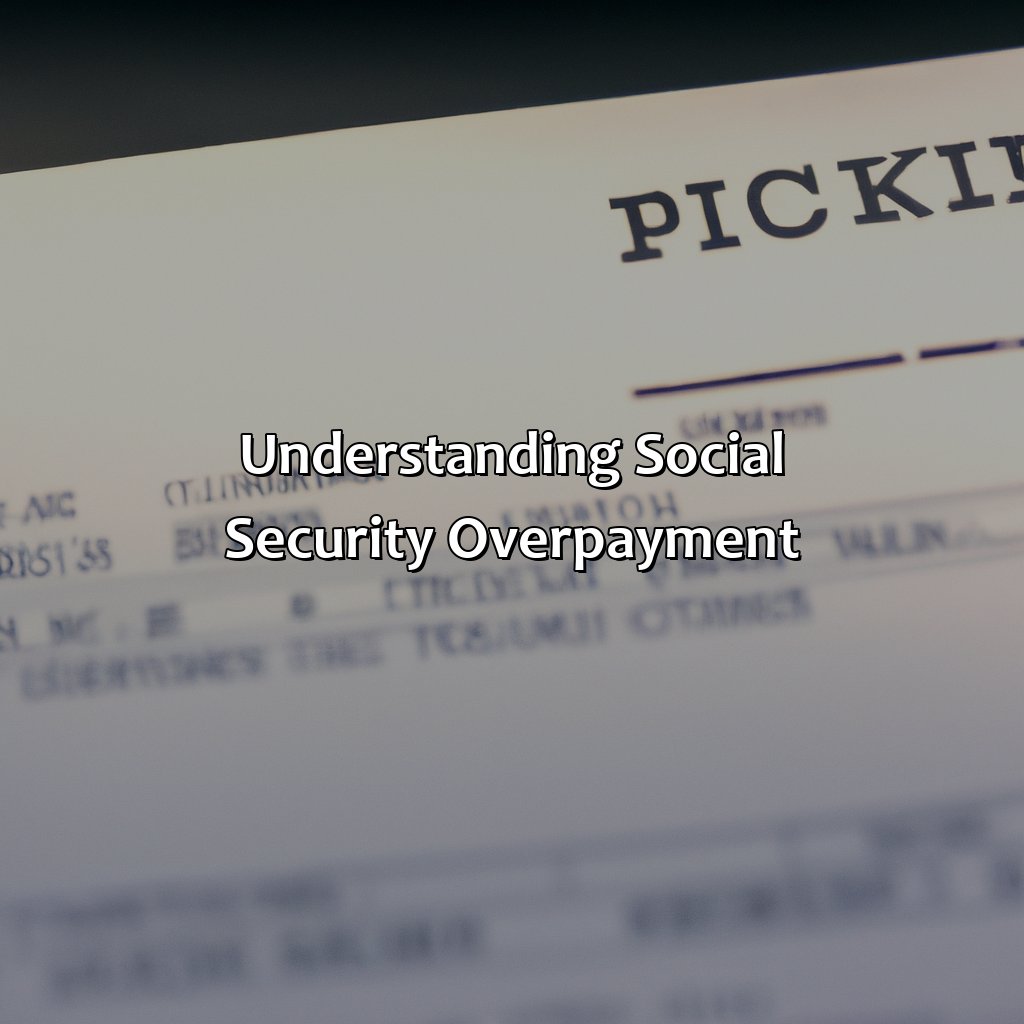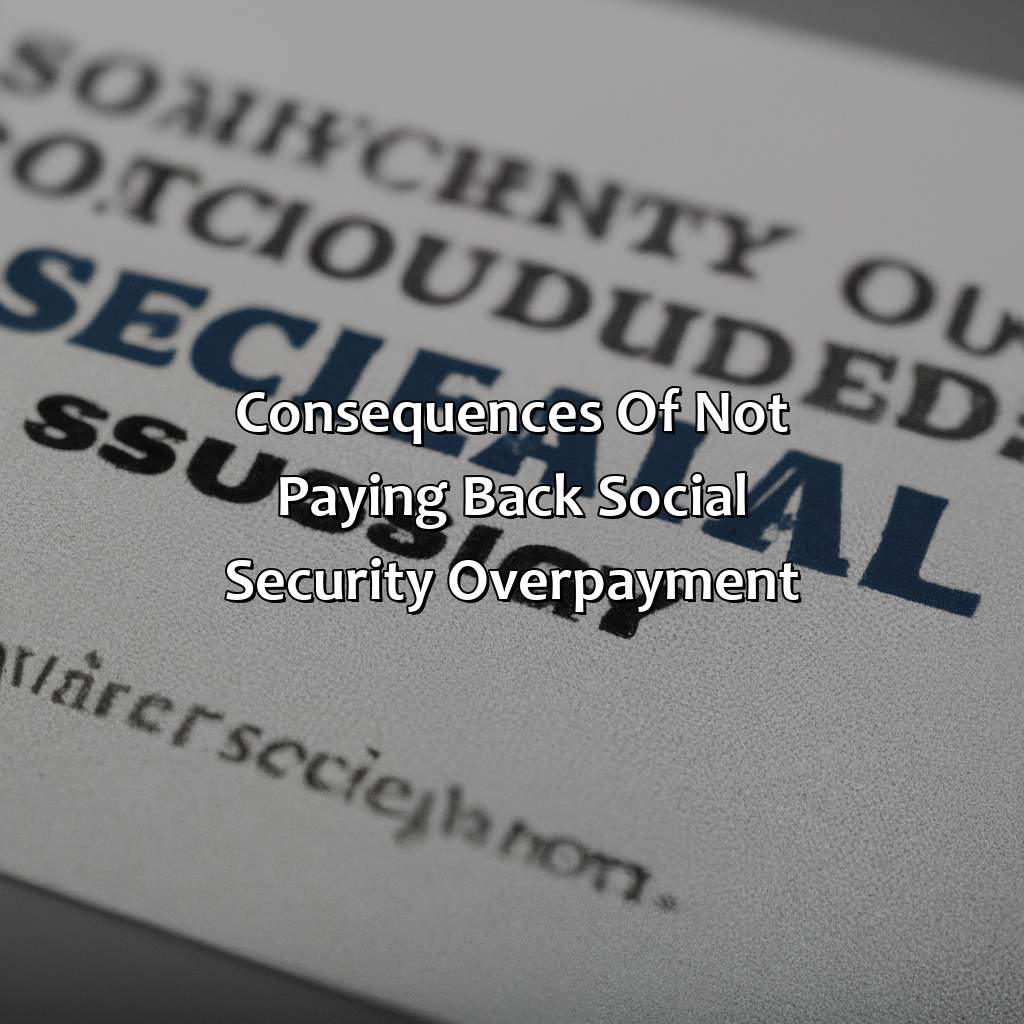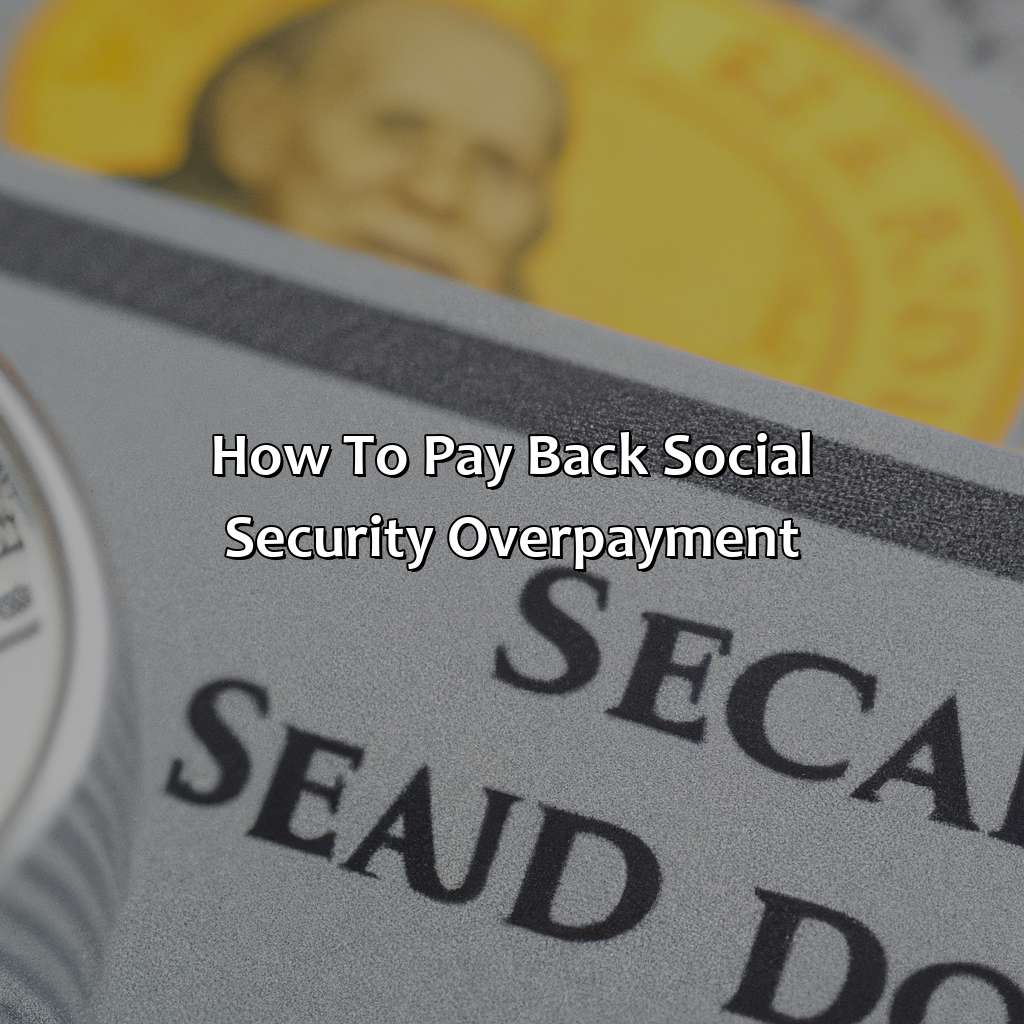How To Pay Back Social Security Overpayment?
Key Takeaway:
- Understanding Social Security Overpayment: It is important to understand what Social Security overpayment is and the reasons for it, including changes in income, inaccurate information, and failure to report changes.
- Ways to Pay Back Social Security Overpayment: You can set up a repayment plan, either full or partial repayment, and take legal help if necessary to pay back Social Security overpayment.
- Consequences of Not Paying Back Social Security Overpayment: If you fail to pay back Social Security overpayment, you may face reduced benefits, collections and legal action, and future ineligibility for Social Security benefits. It is important to take action to avoid these consequences.
Are you struggling with an unexpected social security overpayment? Don’t worry, you’re not alone. This article will give you the resources and information you need to understand and effectively pay off your social security debt.
Understanding Social Security Overpayment
Social Security Overpayment: What You Need to Know
Social Security Overpayment can occur when an individual receives more benefits than what they are entitled to. The reasons behind overpayment can vary, but it is important to understand that Social Security Overpayment can have serious consequences.
If you have received an overpayment, you will be notified by the Social Security Administration. They will send you a letter outlining the amount owed, reasons behind the overpayment, and steps you can take to resolve the issue.
To pay back Social Security Overpayment, there are several options available:
- Repay the entire amount upfront
- Request a payment plan
- Request a reduction or waiver of the overpayment if facing financial hardships.
It is important to note that failure to repay the overpayment can result in garnished wages, withholding of future Social Security benefits, or even legal action.
Understanding the consequences of Social Security Overpayment and taking corrective measures promptly can help avoid financial repercussions. The Social Security Administration also provides guidance and resources to assist individuals in resolving these issues.
In a true story, a retiree was overpaid Social Security benefits due to a clerical error. He was notified by the Social Security Administration and worked with them to create a repayment plan that fit his budget. By taking proactive measures, he was able to avoid serious consequences of non-payment.

Image credits: retiregenz.com by Joel Woodhock
Ways to Pay Back Social Security Overpayment
Want to pay back social security overpayment? Here’s what you can do!
- Set up a repayment plan.
- Repay all, or just part.
- You can even get legal help.
We’ll go into detail so you can pick the best option.

Image credits: retiregenz.com by James Jones
Setting Up the Repayment Plan
To establish a strategy for paying back social security overpayments, you must first determine the terms and conditions that apply to your situation. Take the time to analyze these criteria before reaching out to the Social Security Administration (SSA) and setting up a repayment plan.
Follow this 6-step guide for ‘Establishing Your Repayment Plan’:
- Calculate the amount of overpayment owed to the SSA.
- Gather information on any exemptions or waivers that may apply to your case.
- Contact the SSA debt collector responsible for your case via phone or mail.
- Negotiate a manageable payment schedule with the debt collector.
- Submit payments as agreed upon in your repayment plan.
- Ensure that all repayments are made promptly by monitoring your account regularly.
It is also vital to ensure that you are not missing out on any potential opportunities for financial assistance during this process. Look into state- or community-based programs for aid with medical expenses, food, transportation, and other necessary costs.
A true fact: According to recent reports from CNBC, “About 8 million Americans lost nearly $19 billion in Social Security benefits due to delayed retirement.”
Whether you pay back the full amount or just a portion, one thing’s for sure: Social Security will have its pound of flesh.
Full or Partial Repayment
When repaying Social Security overpayment, it is essential to consider the option of either paying back in full or partially. Full repayment means returning the entire amount that has been overpaid, whereas partial repayment means returning a portion of it.
Partial repayment can be beneficial when one is unable to pay the total amount at once, as it helps avoiding penalties and interest charges. The Social Security Administration offers payment arrangements for individuals who cannot pay back their dues all at once.
It’s important to note that failure to repay social security overpayment can lead to several consequences such as wage garnishment, tax refund interception, or legal action. Thus, deciding to make a partial or full payment requires careful consideration and input from financial experts.
It’s crucial to understand your rights and obligations when dealing with Social Security overpayments. A professional financial advisor can guide you with the entire process and help you create a feasible payment plan based on your income and expenses.
As I was talking to my friend David about his social security overpayments last week, he shared his experience of choosing partial repayment. He felt relieved that he could come up with an affordable monthly installment plan instead of paying back in bulk. His savings from such reasonable installments allowed him to focus on other essential expenses without worrying about exorbitant penalties and interests fees.
Get ready to call your lawyer, because deciphering the Social Security’s overpayment chaos is like navigating a legal maze blindfolded.
Taking Legal Help
When dealing with a Social Security overpayment, seeking legal assistance can be a wise choice. An experienced lawyer can assist in navigating the complex process of appealing the overpayment determination, negotiating repayment terms, and potentially reducing or eliminating the amount owed.
They can also provide guidance on any potential exemptions or adjustments to the repayment amount based on individual circumstances. It’s important to choose an attorney who specializes in this area of law and understands the unique challenges that come with Social Security overpayments.
Additionally, be sure to discuss fee arrangements upfront and review any contracts carefully before signing. Overall, taking legal help can lead to better outcomes and alleviate some of the stress associated with repaying an overpayment.
Pro Tip: Before hiring a lawyer, consider reaching out to organizations such as Legal Aid Society or Disability Rights Advocates for free or reduced-cost assistance.
Skipping out on paying back Social Security overpayments may result in a bigger problem than just having a guilty conscience – hello, legal consequences!
Consequences of Not Paying Back Social Security Overpayment
It is important to know the effects of not repaying Social Security overpayments. This section, “Consequences of Not Paying Back Social Security Overpayment,” will look at what can happen if the debt is not settled. The possible results are listed in sub-sections:
- Reduced Benefits
- Collections and Legal Action
- Future Eligibility for Social Security Benefits
These could bring about long-term consequences.

Image credits: retiregenz.com by David Woodhock
Reduced Benefits
Reduced Social Security Benefits can result from not paying back an overpayment. Here are four points to consider:
- Unpaid overpayments can be deducted from future benefit payments, reducing the total amount received.
- Interest charges add up if the overpayment is not paid promptly, further reducing benefits.
- If the amount is significant, benefits may be stopped entirely until the debt is cleared.
- Legal action can be taken against those who refuse to pay back an overpayment.
It is vital to note that reduced benefits can significantly affect a beneficiary’s finances and quality of life. Social Security Administration often sets up payment plans for those unable to pay back their debts initially.
According to Forbes, “The Government Accountability Office reported in 2015 that approximately $714 million of SSI payments were made improperly due to overpayments.”
If you thought owing money to a collections agency was scary, just wait until they bring out the lawyers for your social security overpayment.
Collections and Legal Action
When you don’t repay the social security overpayment, Social Security Administration (SSA) takes collections and legal actions. Legal actions involve filing a lawsuit against individuals or withholding tax refunds. Collections involve garnishing wages, reducing benefits, and levying bank accounts. If you receive a notice of overpayment from the SSA, it is best to communicate with them to avoid being subjected to collections and legal actions.
To resolve an overpayment issue without legal action, negotiate a payment plan with SSA or request a waiver under exceptional circumstances. An excellent way to build a strong case for waiving your debts is by providing evidence that repaying will lead to significant financial hardship. Be forthcoming about your financial situation when negotiating with SSA as this will help establish the most agreeable repayment plan.
It’s important to know the options available in resolving social security overpayments as not paying back can result in severe consequences such as wage garnishment or having benefits reduced. According to moneycrashers.com, “Approximately one-fifth of all Social Security beneficiaries have some form of their benefits garnished by the agency” due to unpaid overpayments.
Future Eligibility for Social Security Benefits
The non-repayment of social security overpayment might affect future eligibility to receive social security benefits.
Failure to repay the overpayment can lead to reduced monthly payments or even suspension of future benefits.
It is crucial to note that the Social Security Administration (SSA) has a policy of recovering any overpaid benefits, and beneficiaries must comply with repayment requests.
In cases where a beneficiary is not able to pay back the full amount, there are options available for repayment plans tailored to each situation.
In some cases, non-repayment may also result in legal action or debt collection actions taken by the SSA.
Therefore, it is crucial for individuals who have received an overpayment notice to take immediate action and contact the SSA regarding repayment options.
The consequences of not paying back social security overpayments can be severe. An example of this happened in 2016, when a Florida woman failed to repay an overpayment resulting from her deceased husband’s Social Security benefits. She lost nearly $80,000 in future payments and had her account referred for potential credit reporting and tax refund offsets. Hence, it is vital always to respond promptly and adequately when notified of a social security benefit overpayment.
Five Facts About How To Pay Back Social Security Overpayment:
- ✅ Social Security overpayment may happen due to a number of reasons such as inaccurate earnings record or error in reporting income or resources. (Source: The Balance)
- ✅ The Social Security Administration will notify the individual of the overpayment and provide instructions on how to repay. (Source: Social Security Administration)
- ✅ Repayment options include lump-sum payment, installment payments, or reduction of future benefits. (Source: The Simple Dollar)
- ✅ In certain cases, individuals may be able to request a waiver of the overpayment or a reconsideration of the decision. (Source: Disability Secrets)
- ✅ Failing to repay the Social Security overpayment may result in collection efforts, such as withholding or garnishing of future benefits, or even legal action. (Source: AARP)
FAQs about How To Pay Back Social Security Overpayment?
How to pay back social security overpayment?
If you have been overpaid by the Social Security Administration, there are several ways to pay back the overpayment. You can make a lump-sum payment, set up a payment plan, or have the overpayment amount deducted from your future benefits.
Can I negotiate the overpayment amount?
In some cases, you may be able to negotiate the overpayment amount with the Social Security Administration. However, this is typically only possible if there was an error in the calculation or if you can prove that the overpayment would cause financial hardship.
What are the consequences of not paying back the overpayment?
If you do not pay back the overpayment, the Social Security Administration can withhold future benefits, file a lawsuit against you, or even report the overpayment to credit bureaus.
How do I find out how much I owe in overpayment?
You can find out how much you owe in overpayment by contacting the Social Security Administration or checking your Social Security statement. You should also receive a notice in the mail regarding the overpayment.
Can I still receive benefits if I have an overpayment?
Yes, you can still receive benefits if you have an overpayment. However, the overpayment amount will be deducted from your future benefits until the overpayment is paid back in full.
What should I do if I cannot afford to pay back the overpayment?
If you cannot afford to pay back the overpayment, you can contact the Social Security Administration to set up a payment plan or to discuss other repayment options. You may also be able to apply for a waiver of the overpayment if it would cause financial hardship.
